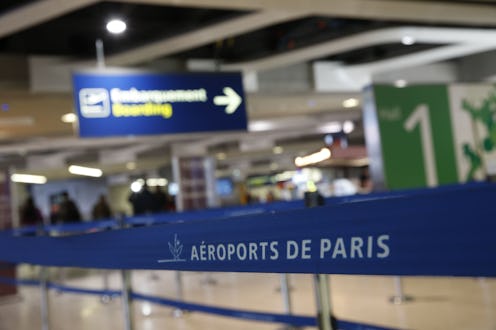News
Charles De Gaulle Security Improved This Year
Egyptian officials and aviation experts have tentatively agreed that terrorism is a more likely cause of Thursday's EgyptAir crash than mechanical failure. When it disappeared from radar, the plane was at a cruising altitude of 37,000 and under an hour from landing. Suddenly the plane made erratic turns and dropped, first to 15,000 feet and then to 9,000 feet before it disappeared from radar and into the Mediterranean below. Flight MS804 was en route to Cairo from Paris, so the first question for many is what's the security at the Paris airport, Charles de Gaulle, like? Update: Egyptian military officials found debris and personal belongings from the EgyptAir flight 804 in the Mediterranean Sea early Friday morning.
There are two airports in the city: Charles de Gaulle and Orly. The plane left Charles de Gaulle, the larger of the two, Wednesday night. Security at both airports was stepped up in November following the ISIS attacks in Paris. In one of the raids in the following days, French police found evidence that terrorists were planning an attack on Charles de Gaulle.
Then in March after the Brussels metro and airport bombings, security was stepped up at the airports again. An extra 400 police officers were deployed to transit hubs around the city, including the airports, on top of the prior November expansion. They also closed public areas of the airports — even the parts before security — to anyone without a ticket.
Also since the Brussels attacks, the Paris airports have added profilers on top of their typical security searches. They are on the lookout for "abnormal behavior." The airport chief, Augustin de Romanet, also said that more security cameras have been added, specifically to the areas "where we need to be able to keep a closer eye on the comings and goings."
Authorities have also begun to focus on the airport workers themselves. Seventy workers who previously had access to secure areas of the airport like the tarmac, cargo storage, and baggage handling areas have had their security passes revoked, "mainly for cases of radicalization," the airport chief said in December. Rules that ban liquids and gels in hand luggage have also been extended to all airport workers entering the facility.
After the November attacks, France began searching airport workers' lockers in an attempt to find any potential terrorist connections. There was concern that a bomb could be placed on board, as is suspected in the downing of the Russian MetroJet flight over Egypt's Sinai Peninsula. More than 85,000 workers have security clearance in Paris's two airports.
There is, of course, the possibility that the security lapse didn't occur in Paris. This was actually the fifth flight of the day with stops in Tunisia, Eritrea, and the airline's hub of Cairo earlier in the day. Phil Giles, a former investigator with the United Kingdom's version of the NTSB, said that the airports the plane visited will be the focus:
It’s a real mystery, but it sounds at this early stage that there could have been some kind of device, either placed on the plane earlier at another airport in some kind of Lockerbie situation or placed on board the plane at Paris, though security is very tight there already. We may see a focus on the air-side staff there in the coming hours and days.
Now, the Paris airports' security may need to be beefed up once again.
